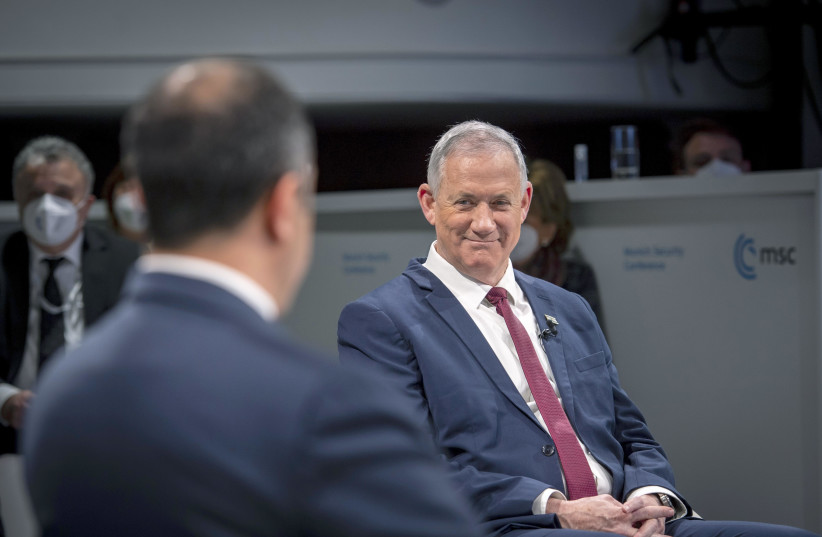In the future, Palestinians will have an entity, but not a full-fledged state, Defense Minister Benny Gantz told the Munich Security Conference on Sunday.
“Eventually we will find ourselves in a two-entity solution, in which we respect Palestinian sovereignty and governance, but we will be respected for our security needs,” he said.
The moderator, Souad Mekhennet, senior security writer at The Washington Post, pushed him on his choice of words, “entities” and not “states,” given that the normative international discourse on a resolution to the conflict is often two states. This would involve the creation of a Palestinian state, alongside the already existing Israeli one.
“Did you say a two-state solution is possible?” the moderator asked.
Gantz corrected the moderator, explaining that he had chosen to speak of two entities and not two states, by way of underscoring his rejection of an Israeli returning to the pre-1967 lines.
To speak of a “two-state solution takes us to a former framework. It’s a phrase that gives the illusion of [a return to]1967 with the border lines, etc.; things that cannot happen.
“This is why I said two-entity solution. We would verify with one another how we can ensure Palestinian rights on one hand while safeguarding Israel’s security needs on the other,” Gantz said.
Only once the issue of Palestinian sovereignty and Israeli security is resolved can one move forward... for a final resolution of the conflict, Gantz said.
“We cannot ignore the existence of the Palestinians and the Palestinians cannot ignore the existence of us Israelis in the area and we must find ways of living with one another,” Gantz said.
“Both sides should take historic decisions,” he emphasized.
“I hope that one day we can create a new reality... to take the realities on the ground [into account],” he said.
Gantz recalled that he had twice met Palestinian Authority President Mahmoud Abbas because “We must maintain a strategic connection. We must maintain security. I am sure we must promote the [Palestinian] economy. Slowly but surely we will separate from one another and create a better reference for future discussion on what a permanent agreement would look like,” he said.
The views of Gantz, who heads the centrist Blue and White Party, do not reflect the overall position of the government, which enjoys a wide range of views on the Israeli-Palestinian conflict. Meretz has spoken of a two-state resolution to the conflict, while Prime Minister Naftali Bennett, who heads the right-wing Yamina party, does not believe in talking to Palestinian officials at this time. Gantz, however, strongly advocates negotiation with Palestinians.

